Key takeaways:
- Peer review anxiety is common among researchers, often stemming from fears of rejection and personal critique, but can lead to growth through constructive feedback.
- The peer review process is essential for maintaining research quality and fosters collaboration and mentorship within the academic community.
- Strategies to manage anxiety include taking breaks, seeking peer support, and practicing mindfulness before reviewing feedback.
- Engaging with past reviews and creating checklists helps prepare for feedback, transforming anxiety into a more manageable and constructive experience.
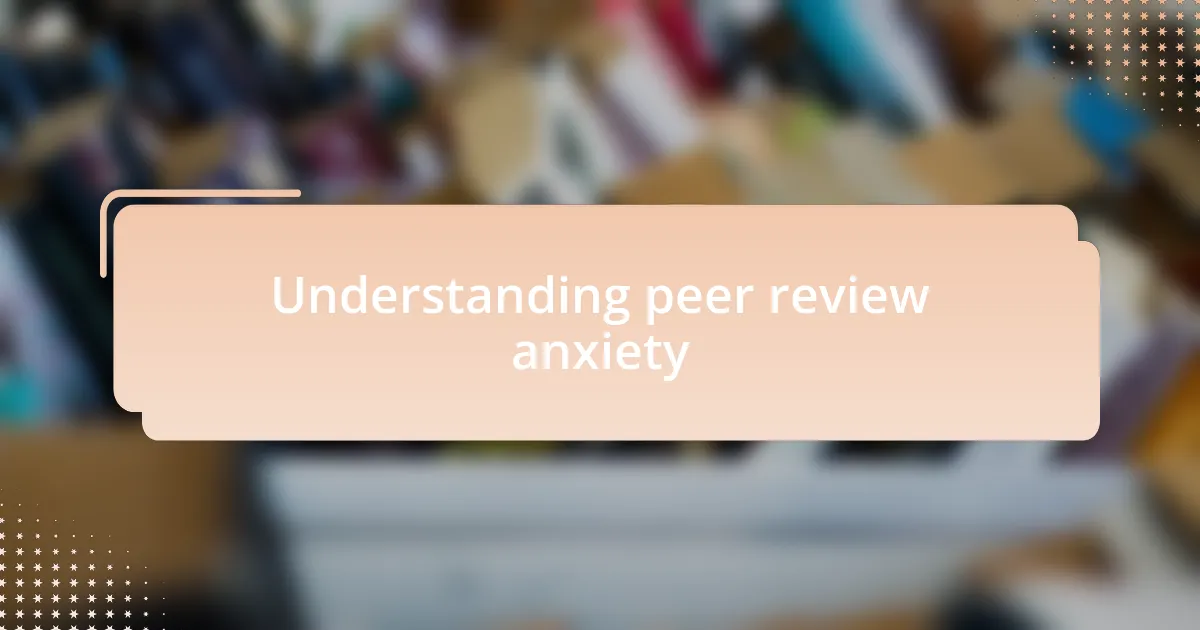
Understanding peer review anxiety
Peer review anxiety is a common experience that many researchers face, and I sympathize with those who feel overwhelmed by the prospect of judgment. It can be unsettling to think that your hard work, your ideas, might be critiqued by others. I remember my first submission; I couldn’t shake the feeling that I was putting my intellectual child out into the world, vulnerable and open to scrutiny.
Often, this anxiety stems from a fear of rejection or inadequate research. I’ve found myself questioning, “What if they don’t get my approach?” This inner dialogue can be exhausting. When I receive feedback, I’ve learned it’s not just a verdict on my work; it’s an opportunity for growth. I try to remind myself that constructive criticism, while sometimes difficult to digest, can ultimately sharpen my argument and enhance my clarity.
The reality is that peer review is a standard part of the academic process, yet understanding this doesn’t always alleviate the fear. I think back to a set of revisions I received that felt like a mountain of critique. At that moment, it was challenging not to take it personally, yet stepping back allowed me to see the reviewers’ insights as invaluable. It’s crucial to remember that even seasoned scholars experience this anxiety; recognizing that we are all in this together can sometimes ease the burden.
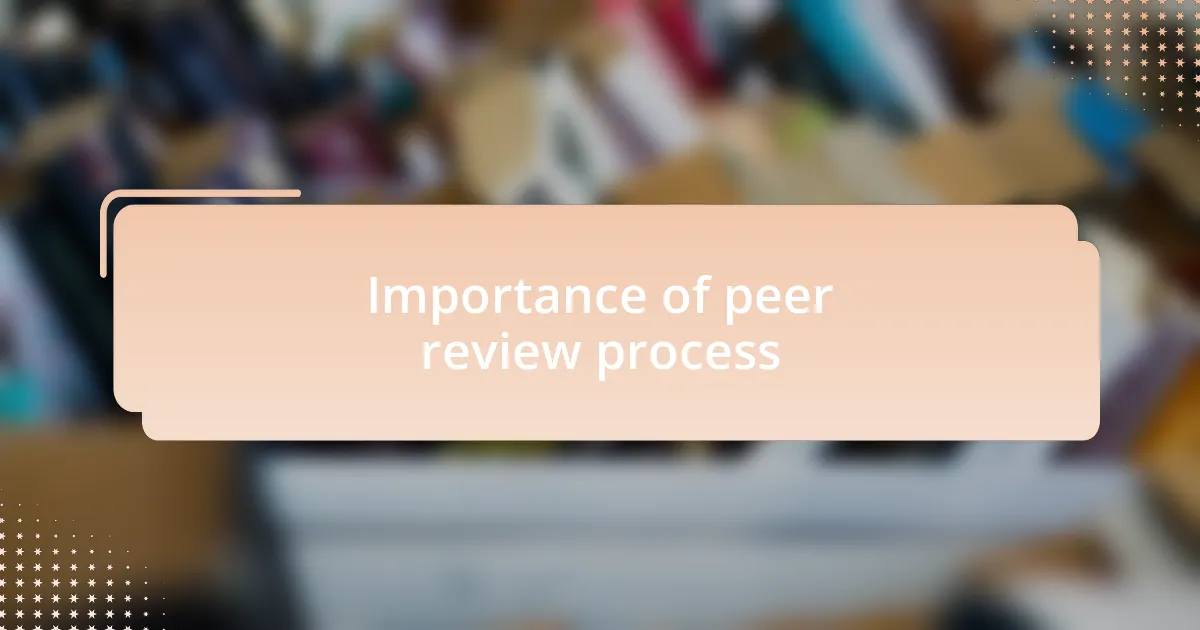
Importance of peer review process
The peer review process plays a vital role in ensuring the integrity and quality of academic research. I vividly recall a time when a colleague’s article underwent extensive scrutiny and ultimately emerged stronger. It was a reminder that feedback isn’t just about critique; it’s a collective effort to elevate our field’s standards. Isn’t it reassuring to think that our work is being refined through such an important dialogue?
Moreover, peer review acts as a gatekeeper, filtering out flawed studies that could mislead others. I’ve often thought of it as a safeguard—it keeps the research community aligned with rigorous scientific methods. This perspective helps me view the sometimes daunting review process as a collaborative checkpoint rather than a solitary judgment.
Engaging with reviewers not only fosters scholarly improvement but also builds networks of support within academia. I remember striking up a conversation with a reviewer who later became a mentor, all thanks to that initial critique. Did you know some of the best professional relationships start during the review process? I find that when we embrace this opportunity, we are not just recipients of feedback; we become part of an enriching academic community.
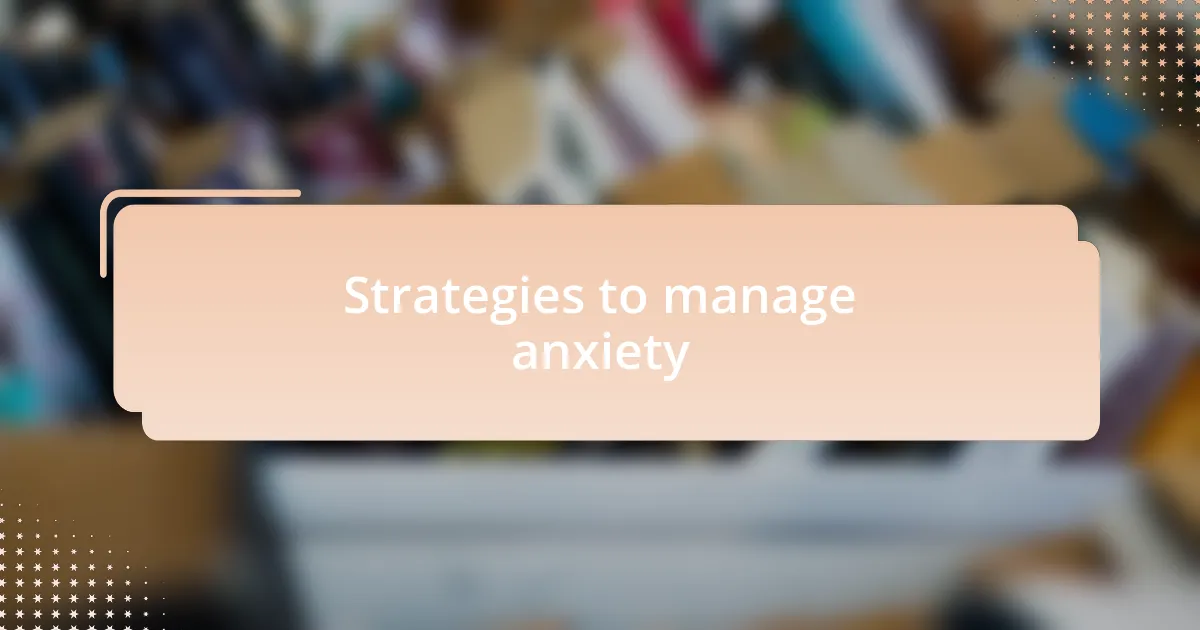
Strategies to manage anxiety
When I first started receiving peer reviews, anxiety often crept in. To manage this feeling, I developed a routine of stepping back from the work for a few days. This break allows me to return with fresh eyes, making the feedback seem less daunting and easier to digest. Have you ever noticed how a little distance changes your perspective?
Another strategy that has helped me is seeking support from colleagues. Just last year, I shared a particularly challenging review with a trusted friend, and we discussed it over coffee. This conversation not only eased my worries but also provided practical insights into handling the critiques. Isn’t it amazing how talking things through can bring clarity?
Lastly, I practice mindfulness techniques before diving into the review comments. Deep breathing or short meditation sessions help me center myself, transforming anxiety into focused energy. I find that when I approach the feedback with a calm mind, I can better identify actionable improvements. Do you have any rituals to calm your nerves before facing potential critiques?
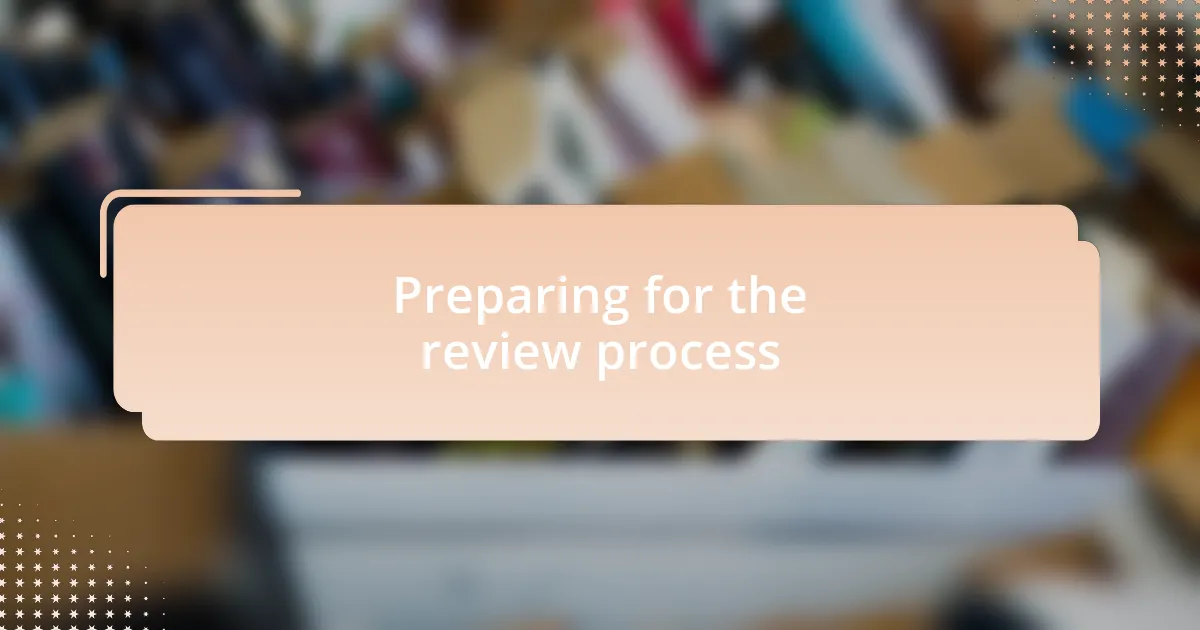
Preparing for the review process
Preparing for the review process can feel overwhelming, especially when that notification lands in your inbox. I remember the first time I saw a review request—I felt my heart race. Now, I take a moment to organize my thoughts before I read the feedback. Instead of diving straight into the comments, I jot down reflections on my initial expectations and concerns. This simple act helps me establish a clearer mindset and curbs the anxiety that often accompanies the unknown.
Many people overlook the importance of familiarity with the reviewers’ comments. I discovered that reading previous reviews has been pivotal in easing my anxiety. I like to compile a folder of past critiques, which not only prepares me for the types of feedback I might receive but also shows how much I’ve grown as a scholar. Have you ever thought about how viewing past feedback can transform your approach to new reviews? It makes the whole process feel like a continuous conversation rather than a one-off evaluation.
Creating a checklist of potential questions while preparing for the peer review is another step I find invaluable. I ask myself, “What specific points do I want to address?” or “Which sections could benefit from additional clarification?” This way, when I finally read the review, I feel a sense of control. That control, I believe, significantly reduces the initial apprehension. How do you plan for peer reviews? Perhaps starting with a simple checklist could change your approach, as it has for me.
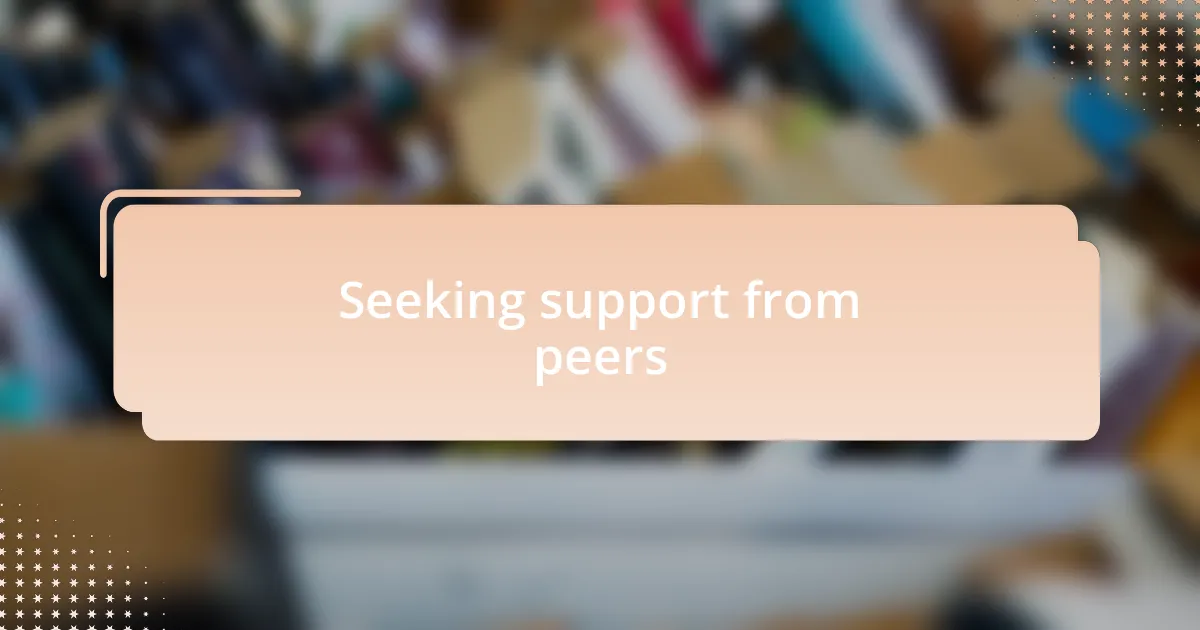
Seeking support from peers
Reaching out to colleagues for support during the peer review process can make a world of difference. I remember sharing my first set of reviews with a trusted friend in my field. Their perspective helped me see the feedback not as a personal attack, but as a constructive tool for growth. Have you ever confided in a peer? Sometimes just knowing you’re not alone in this can lighten the emotional weight.
When I face daunting comments, I often turn to my academic network for advice. Just last month, I organized a small gathering of fellow researchers where we discussed our experiences with reviews. This informal setting allowed us to share vulnerabilities and coping strategies, turning anxiety into collaboration. By exchanging stories, I felt empowered rather than isolated. How often do you seek that kind of camaraderie?
Additionally, I’ve learned the value of a support buddy who can help dissect reviews. This past year, a fellow scholar and I formed a pact to review each other’s manuscripts and feedback. It’s a process that fosters accountability and builds confidence. With a peer by your side, the review becomes a shared journey, which truly diminishes the fear of judgment. Isn’t it comforting to have someone understand the challenges of academic scrutiny just as you do?
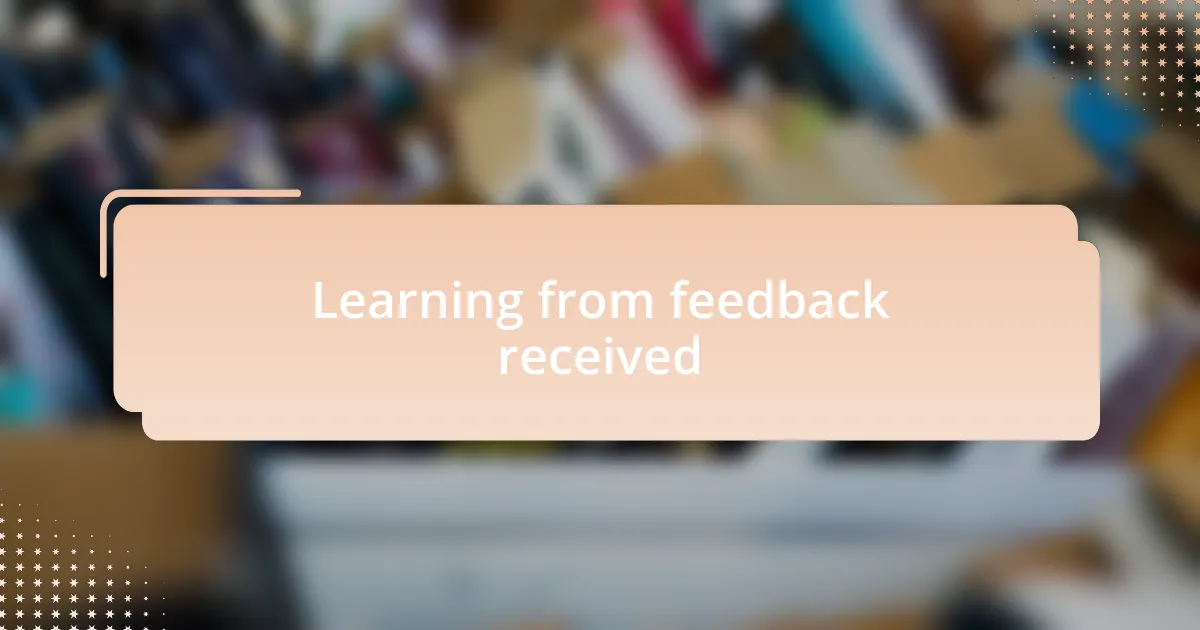
Learning from feedback received
Receiving feedback can feel overwhelming, but I’ve found it enriches my work immensely. One memorable instance was when I submitted a paper that I was proud of but ended up with extensive critiques. Initially, I felt deflated, but then I realized that each comment was an opportunity to refine my ideas. Have you ever had that moment when criticism transformed your perspective?
I remember meticulously going through a detailed review on a manuscript I had labored over for months. At first, I was frustrated by the suggestions, especially when they seemed contradictory to my original vision. However, after taking a step back, I began to embrace the notion that feedback means others are invested in my success. This shift in mindset made the revisions not just bearable but exciting! How often do we let feedback challenge us in ways that spark new creativity?
Moreover, I’ve learned to celebrate the smaller victories that come from processing feedback. When a reviewer highlighted a particularly strong section of my work, it reminded me that my voice has value. This reinforcement motivates me to delve deeper into my research. Isn’t it interesting how some critiques can lead to self-discovery and growth? Each review is a chance to evolve and push the boundaries of my scholarship.